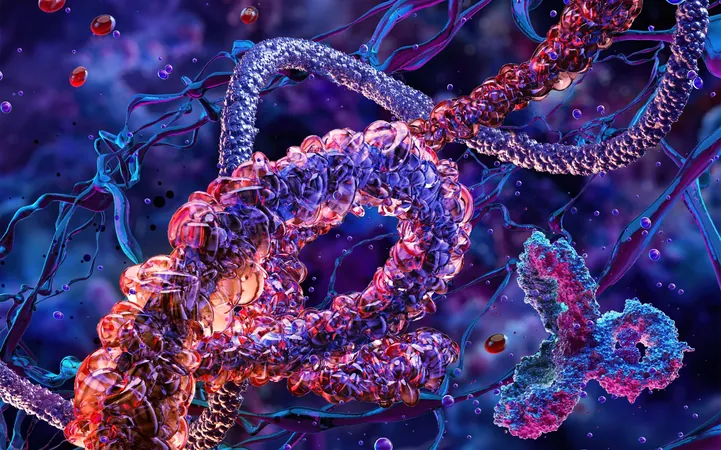
Unlocking Life's Origins: How Water Sparked the Birth of Proteins
2025-08-31
Author: Ming
The Quest for Life's Building Blocks
Proteins are the unsung heroes of life, performing vital functions from cell repair to immune defense. But how did the very first proteins come into existence on our planet, long before the complex machinery of modern cells?
Breakthrough Study from UCL
A groundbreaking study from researchers at University College London (UCL), led by Professor Matthew Powner, shines new light on this mystery. Their findings reveal a simple, water-friendly reaction that could have set the stage for the evolution of protein-making.
RNA Meets Amino Acids
The research highlights an exciting discovery: RNA, a molecule that not only stores and transfers genetic information but can also catalyze reactions, can form chemical connections with amino acids—the building blocks of proteins. Miraculously, this linkage occurs under mild conditions in water, opening up new possibilities for understanding life's origins.
The Power of Sulfur Chemistry
At the heart of this study is the role of sulfur compounds. Thioesters, which are vital in modern metabolic reactions, proved to be key players in early protein-related chemistry on Earth. These compounds can react in water without disintegrating, making them ideal for primordial environments.
Two-Step Reaction Unveiled
The researchers discovered a fascinating two-step process: first, thioesters help attach amino acids to RNA, creating aminoacyl RNA in a neutral pH environment. Next, a mild oxidant prompts the formation of peptide bonds, resulting in high yields of peptidyl RNA—a significant step towards generating protein-like structures.
Bridging Chemistry and Biology
This study has profound implications, showcasing how RNA could manage amino acids even before the advent of proteins. It offers a compelling solution to the age-old chicken-or-egg dilemma of which came first: RNA or proteins?
The Modern Genetic Code's Ancestry
By favoring precise attachments and utilizing duplex control, this chemistry may provide clues about how the genetic code developed, suggesting that early RNA could employ simple rules to format peptide sequences. This crucial step could eventually lead to the sophisticated ribosomal machinery we see in modern cells.
A Glimpse into Early Earth
Environments rich in neutral water—like pools or lake shores—likely played a crucial role in these early reactions. In fact, researchers observed that freeze-concentration cycles could accelerate these processes, showing how nature may have facilitated life's complex beginnings.
Conclusion: A Step Closer to Understanding Life's Origins
As we unravel the chemistry fueling life's beginnings, this study published in the journal Nature takes us one step closer to understanding how the first proteins may have formed. With every discovery, we edge nearer to the intricate puzzle of life’s origins, revealing how chemistry transitioned into biology.



 Brasil (PT)
Brasil (PT)
 Canada (EN)
Canada (EN)
 Chile (ES)
Chile (ES)
 Česko (CS)
Česko (CS)
 대한민국 (KO)
대한민국 (KO)
 España (ES)
España (ES)
 France (FR)
France (FR)
 Hong Kong (EN)
Hong Kong (EN)
 Italia (IT)
Italia (IT)
 日本 (JA)
日本 (JA)
 Magyarország (HU)
Magyarország (HU)
 Norge (NO)
Norge (NO)
 Polska (PL)
Polska (PL)
 Schweiz (DE)
Schweiz (DE)
 Singapore (EN)
Singapore (EN)
 Sverige (SV)
Sverige (SV)
 Suomi (FI)
Suomi (FI)
 Türkiye (TR)
Türkiye (TR)
 الإمارات العربية المتحدة (AR)
الإمارات العربية المتحدة (AR)